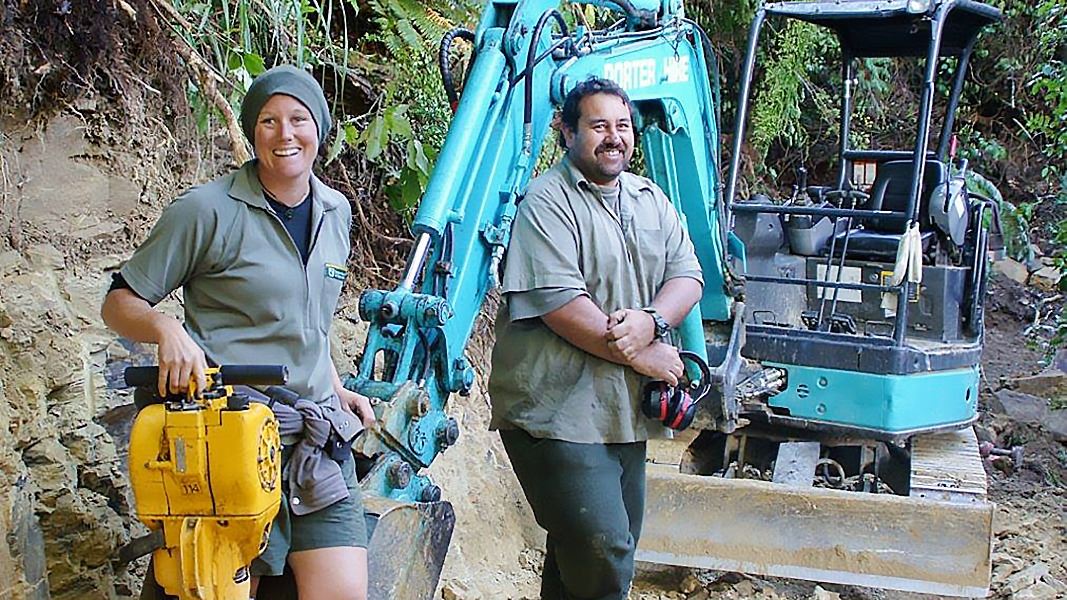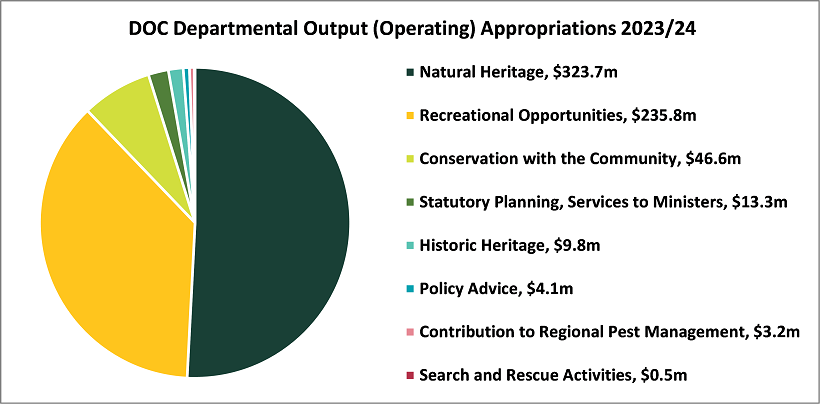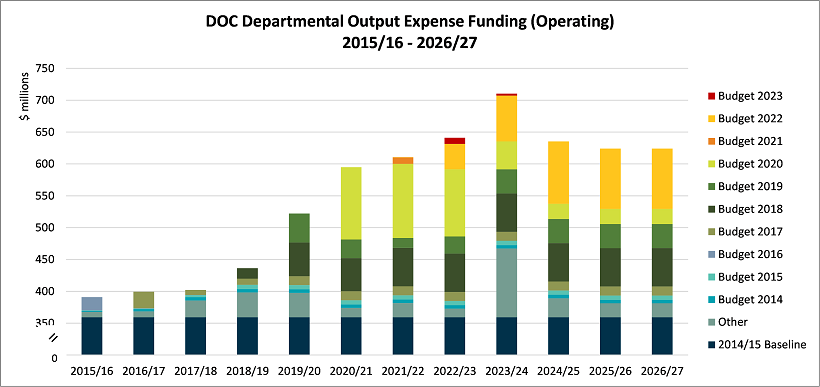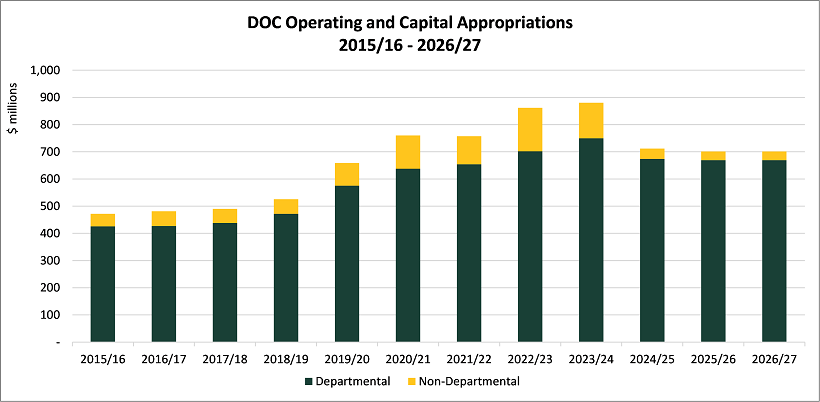
Introduction
An overview of the Budget 2023 funding to the Department of Conservation.Date: 18 May 2023
As part of the Budget 2023 process, DOC will receive an extra $25.9m of operating funding and $10.9m of capital funding over four years to 2026/27 for Vote Conservation.
Budget 2023 initiatives
- $24.2m for the purchase of farming assets on the Molesworth Recreation Reserve from Landcorp, in accordance with the existing lease agreement.
- $12.6m to assist with the re-plan and rebuild of biodiversity, heritage, visitor and other conservation sites and assets that were damaged or destroyed in the 2023 North Island Weather Events. Funding will enable critical response and recovery work across the 19 North Island Conservation Districts that sustained damage.
- An additional amount will be received for the 2022/23 financial year to give effect to the Public Sector Pay Adjustment. The amounts are not being reported due to bargaining sensitivities.
DOC's 2023/24 departmental appropriations
DOC’s departmental output appropriations have increased by $58m, from $652m in 2022/23 to $710m in 2023/24.
The increase in funding is driven primarily by a baseline uplift that DOC secured through the Budget 2022 Natural Resources Cluster process. Through this process, DOC’s baseline increases were determined in 2022 for the following three years (Budgets 2022, 2023 and 2024).
This means that, barring some exceptions (such as the North Island Weather Event response and recovery initiative), the next time DOC can seek additional funding for new initiatives or cost pressure initiatives is at Budget 2025. DOC is still able to submit Capital initiatives as part of the annual budget process.
The 2022 baseline uplift included:
- funding for new initiatives, which is enabling DOC to boost predator control for threatened native species, establish a national programme for deer management and goat control, and improve marine protection.
- funding to address key organisational cost pressures, including inflation and wage pressures, and the management of DOC’s extensive visitor assets.
Through Budget 2023, DOC has received funding for three initiatives. The majority of the funding ($34m out of $40m received) will be appropriated in the 2022/23 year.
DOC will continue to prioritise budgets to ensure core services are delivered and financial resources are allocated to high priority work.
The following chart shows DOC’s departmental appropriations in 2023/24:

Departmental appropriations across eight categories
DOC departmental output (operating) appropriations 2023/24:
- Natural heritage, $323.7m
- Recreational opportunities, $235.8m
- Conservation with the community, $46.6m
- Statutory planning, services to Ministers, $13.3m
- Historic heritage, $9.8m
- Policy advice, $4.1m
- Contribution to regional pest management, $3.2m
- Search and rescue activities, $0.5m
Overview of departmental output expense funding over time
The following chart shows funding received over the past 12 years above the 2014/15 baseline. It includes Budgets 2014 – 2023. The most significant funding uplifts were secured at Budget 2020, which included the Government’s COVID-19 response Jobs for Nature package of $501.8m over four years, and Budget 2022, which included $400m of capital and operating funding through to 2025/26 (of which $305m is for departmental output expenditure excluding tagged contingent funding).

Departmental output expense funding from 2015 until 2027
When reviewing the graph above, be aware that:
- ‘Other’ budget movements include changes to third party and crown concessions revenue, and baseline transfers and adjustment since 2014/15
- DOC's funding from 2023/24 onwards is per Main Estimates 2023/24 and is subject to change pending future budgets and baseline adjustments, and
- tagged contingency funding has been excluded.
Budget initiatives
The following initiatives were included at each Budget (the dollar amounts refer to the first four years of funding).
| Budget | Initiative |
|---|---|
| Budget 2023 | Public Sector Pay Adjustment – Vote Conservation Remuneration Cost Pressure (TBA) |
| Addressing damage to Conservation sites and assets caused by the 2023 North Island Weather Events ($9.1m) | |
| Budget 2022 | Implementing the Aotearoa New Zealand Biodiversity Strategy 2020: Collective delivery of the Predator Free 2050 Strategy ($61.6m) |
| Addressing inflationary and wage pressures ($53.7m) | |
| Fit for purpose recreation assets ($32.4m) | |
| Implementing the Aotearoa New Zealand Biodiversity Strategy: Ramping up deer management and goat control ($30.0m) | |
| Legislative and regulatory compliance ($28.0m) | |
| Maintaining National Predator Control Programme Levels ($26.9m) | |
| Corporate Property – Remediation and Maintenance of Residential and Commercial Properties and Associated Infrastructure ($25.0m) | |
| Protecting our cultural heritage ($13.2m) | |
| Implementation of marine protection and localised management actions ($12.0m) | |
| Reducing extinction risk for key flagship marine species ($7.1m) | |
| Passenger Vehicle Electrification Project ($5.0m) | |
| Maximising carbon storage: Increasing natural sequestration to achieve New Zealand’s future carbon goals ($3.4m) | |
| Budget 2021 | Preserving Concession Funding ($10.0m) |
| Budget 2020 | Jobs for Nature: Kaimahi for nature ($200.0m) |
| Jobs for Nature: Restoring nature ($154.3m) | |
| Jobs for Nature: Protecting nature ($147.5m) | |
| Ngāi Tai Supreme Court Decisions ($7.9m) | |
| Southern South Island flood recovery contingency ($4.0m) | |
| Budget 2019 | International Visitor Levy ($106.2m) |
| Improving safety and security ($10.7m) | |
| Provincial Growth Fund ($0.3m) | |
| Budget 2018 | Predator control ($81.3m) |
| Biodiversity contingency ($76.0m) | |
| Organisational capability ($16.2m) | |
| Visitor management ($5.5m) | |
| Biodiversity in Mackenzie Basin ($2.6m) | |
| Budget 2017 | Tourism infrastructure - maintenance ($33.1m) |
| Tourism growth initiative - new walks ($11.5m) | |
| Battle for Our Birds ($21.3m) | |
| Port Hill fires ($4.8m) | |
| Marine protection and development ($0.8m) | |
| Regional Growth Programme ($0.4m) | |
| Predator control ($81.3m) | |
| Budget 2016 | Battle for our Birds ($20.7m) |
| Funding for Game Animal Council ($0.6m) | |
| Budget 2015 | Save Our Iconic Kiwi ($11.2m) |
| Budget 2014 | Kauri dieback ($16.4m) |
When reviewing the table, be aware that:
- Dollar amounts refer to the first four years of funding.
- 'Other' refers to third party and crown concessions revenue, and baseline transfers and adjustment since 2014/15.
- 2015/16 – 2021/22 reflect final budget at Supplementary Estimates.
- 2022/23 – 2025/26 are as at Main Estimates 2022/23 and are subject to change pending future budgets and baseline adjustments.
Trend in DOC’s appropriations
Vote Conservation has two main components:
- Departmental spending, which includes DOC's operating and capital budget
- Non-departmental spending, which DOC spends on behalf of the Crown, e.g. grants to community conservation funds and the protection of biodiversity on private and Māori land.

DOC operating and capital appropriations from 2015 until 2027
The graph above shows how DOC’s departmental appropriations (including operating and capital) and non-departmental appropriations (including operating and capital) have changed over time.
The increases in departmental and non-departmental appropriations since 2019/20 have been driven by the Covid Recovery and Relief Funds received at Budget 2020, including the Jobs for Nature initiatives and the Wildlife Institutions Relief Fund, and initiatives funded through the Budget 2022 Natural Resources Cluster process.
As the Covid Recovery and Wildlife Institutions Relief Funding is time limited the graph shows decreases to appropriations by 2024/25.